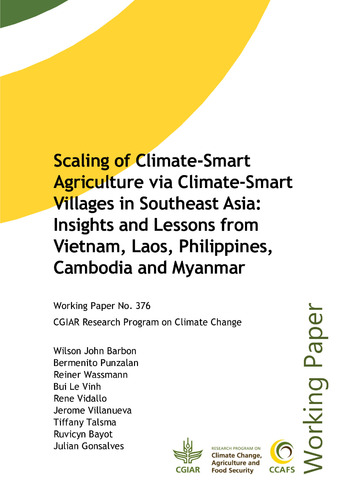Scaling of Climate-Smart Agriculture via Climate-Smart Villages in Southeast Asia: Insights and Lessons from Vietnam, Laos, Philippines, Cambodia and Myanmar
This strong correlation between agriculture and climate change has led to the emergence of climate-smart agriculture (CSA) that seeks to balance agricultural productivity within the bounds of our climate. The CSV approach is participatory research for development approach that serve as testing ground for best context-specific CSA technologies and practices. International organizations have identified scaling of agricultural innovations as a priority agenda. In 2015, CGIAR-CCAFS began expanding the CSV approach in Southeast Asia with the establishment of seven CSVs in the region. Through the efforts of various partners, these CSVs have grown to 90 CSVs. This paper is presented as synthesis of the diverse experiences of the CSVs in Southeast Asia. The authors have reviewed key publications generated since 2015 in order to draw highlights and key lessons on scaling CSA via the CSV approach. The pathways of scaling can be through knowledge transfer, policy incidence and commercialization. Scaling can also be technology-driven and institution-driven processes. In the experience of the CSVs in Southeast Asia, a combination of various approaches was implemented to achieve scaling of CSA via CSVs. The CSVs have leveraged knowledge transfer activities via farmer-farmer to engagements and roving workshops. The CSVs also maximized the opportunities in national policies where it can mainstream CSA and CSVs. Policies such as Vietnam’s Nong Thon Moi national rural development program, Myanmar’s Climate-Smart Agriculture Strategy and the Philippine Department of Agriculture systemwide program called Adaptation and Mitigation Initiative in Agriculture, are all significant policy drivers of scaling CSA via CSVs in these countries. Albeit, on its early stages, the CSV in the Philippines and the work of IIRR in Cambodia have also utilized an economic, market-driven approach to scaling specific CSA options for these communities.

